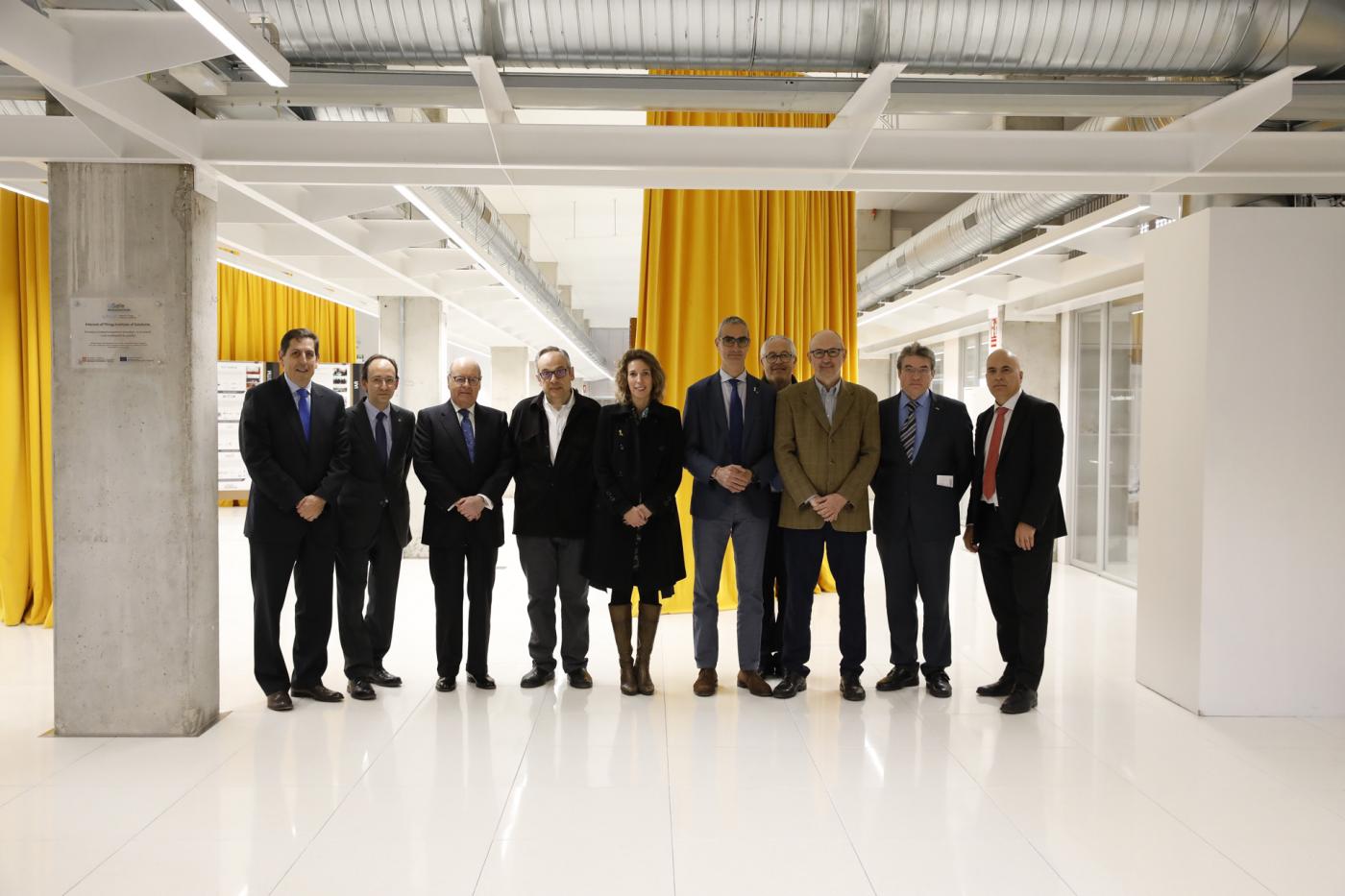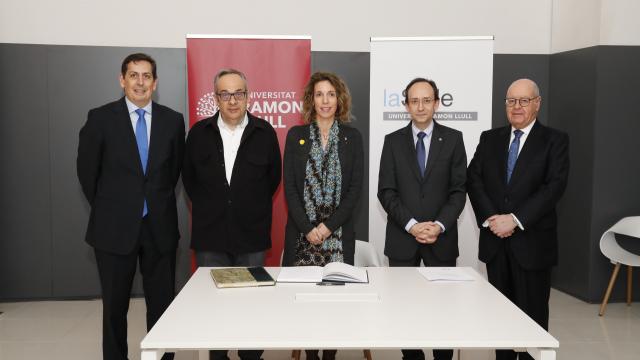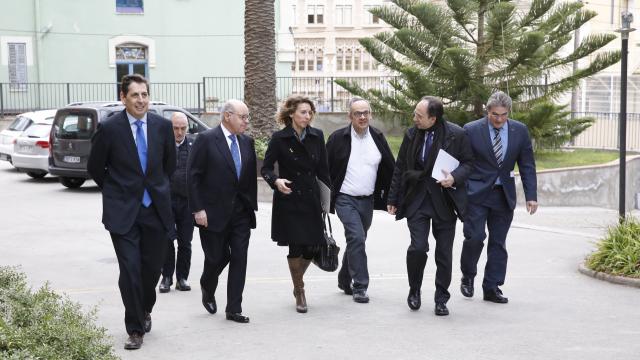La Salle-URL has inaugurated the Internet of Things Institute of Catalonia, a project co-financed by the European Union, that consolidates Catalonia as a European hub of knowledge and reinforces the learning by challenge methodology as the driving force behind learning at La Salle - Ramon Llull University. The space dedicated to research spans almost 2,000 m², and is the first interdisciplinary laboratory in Catalonia. It is committed to promoting the transfer of knowledge between university and business, and to helping develop some of today’s main technological challenges, such as the Internet of Things, Big Data and Smart Cities. The opening ceremony was attended by the Catalan Minister for Business and Knowledge, Àngels Chacón; the Rector of Ramon Llull University (URL), Josep Maria Garrell; the Director General of La Salle Campus Barcelona - URL, Josep M. Santos; and Jerome Engel, Assistant Professor Emeritus of the Haas School of Business (University of California, Berkeley) and visiting professor at La Salle-URL.
The laboratory was created thanks to support from the Department of Business and Knowledge of the Catalan Government, which was responsible for granting co-financing from the European Regional Development Fund (ERDF) in the amount of 1,015,272.33 euros. Minister Àngels Chacón highlighted the importance of financing projects of this type: “Our Department will continue to support initiatives like this, which seek to transfer between research and the productive fabric”. The Internet of Things Institute of Catalonia connects various social agents, focusing on innovation related to the specific areas of knowledge of La Salle-URL: Engineering, Architecture, Management, Digital Arts and Animation & VFX. Josep M. Santos, the Director General of La Salle-URL, summarised the institution's commitment in designing this space: “Three years ago we set out to deliver a 50% increase in the number of square meters dedicated to research, innovation and transfer in contact with companies and entrepreneurs”.
Work on construction of the Internet of Things Institute of Catalonia began in February 2017 and has seen investment of 2.4 million euros, with co-financing of 50% by the European Regional Development Fund under Axis 1 of the ERDF Operational Programme for Catalonia 2014-2020, which aims to promote research, technological development and innovation. The Department of Business and Knowledge of the Catalan Government is responsible for granting this co-financing. Since its inauguration, the laboratory is home to 73 researchers and this number is expected to increase gradually over the next few years.
Development of the Internet of Things, a priority
“Technologies such as the Internet of Things can also be applied to solve social challenges such as climate change and health. The Internet of Things Institute of Catalonia is a new asset in the knowledge ecosystem of Catalonia, which will help to develop talent,”explained Minister Chacón. In this regard, the lab aims to make a decisive contribution to the development of innovation in Catalonia, focusing on the major challenges facing today’s society in the field of technology, such as Big Data, Smart Cities and, in particular, the Internet of things. The Internet of Things Institute of Catalonia will identify the relationship between people and their environment, analysing the omnipresence of technology and the impact of the Internet of Things on the interaction between all social agents. Given the need to face these transversal challenges, the lab will become a unique meeting point in Europe, committed to disseminating and increasing the study and transfer of everything related to the interaction of people with their environment.
The research and transfer projects will be conceived within spaces of creativity, will go through the R&D laboratory and will be validated from a perspective of the market and business. The technological challenge proposed by the Internet of Things Institute of Catalonia focuses on collaboration, in a process that is planned in several phases. By designing interdisciplinary dynamics and spaces for collaboration between expert researchers in various sectors, the aim is to move from theory to practical application and validation. The final aim is to deepen the relationship between university and business and to facilitate the transfer of knowledge. The intention is for the lab to be a living place, with projects and ideas to transform society emerging every day. “The Internet of Things Institute of Catalonia is the catalyst for a change of paradigm in the way La Salle undertakes research”, explained Rosa Mª Alsina, Director of Research Policy at La Salle-URL.
“We have long been focusing the research we do at URL towards challenges and innovation. The Internet of Things Institute of Catalonia is a clear example of this: it’s not just a new facility, it’s a project that will allow research to have a social impact, and it does so with the complicity of the Catalan Government”, stated the rector of URL, Josep Maria Garrell. The laboratory is structured as a common social agora, a central meeting area for debate, display and contrast. Leading off from this central forum are the groups’ labs, which make up the Makerspace, a workspace designed to provide tools to the community of researchers so that they can develop projects linked to the transfer areas of the Internet of Things Institute of Catalonia. This space hopes to encourage participatory development, facilitate interdisciplinary learning and promote co-creation activities through rapid prototyping.
La Salle R&D: a boost for innovation
Through the Internet of Things Institute of Catalonia, La Salle-URL will focus on applied research for the benefit of society in the short term. To this end, the Campus has multidisciplinary, collaborative teams, made up of prestigious researchers committed to excellence and transversal projects.
There are currently six research groups from different knowledge areas that have been integrated into the Internet of Things Institute of Catalonia:
- Data Science for the Digital Society (DS4DS): This group is dedicated to providing a holistic understanding of complex systems using artificial intelligence, machine learning and statistical techniques, and assesses the impact of such solutions on society.
- Integrated Architectural Research (IAR): This group investigates architecture in the mainstream of academic research, while seeking to recognise the strong links that research in architecture has with professional practices.
- Research Group on Media Technologies (GTM): This group studies the interactions between humans, machines and their environments. Their lines of research cover various fields, including acoustics, signal processing, human-computer interaction and animation.
- Group of Research in Entrepreneurship and Technology-Based Innovation (GREITM): This group investigates the impact of digitalisation on organisations, the relationship with organisational capabilities, value propositions and dependencies between companies.
- Group of Research in Technology Enhanced Learning (GRETEL): This research group focuses on investigating the implications of the application of technologies (gamification, AUX, learning analysis and virtual visualisation) in all phases of learning: design, implementation, verification and evaluation.
- Research Group on Internet Technologies & Storage (GRITS): This group works on the key cutting-edge enabling technologies needed for the coming digital transformation including the Internet of Things (IoT), Cloud Computing, Cybersecurity, Big Data, Advanced Antennas, Future Network Architecture (FNA) and the Web of Things (WoT).
Among the projects to be developed in the facilities are BEGiN, which incorporates technologies for the diagnosis of schizophrenia with facial markers; ATHIKA, a project on health data in which La Salle-URL is associated with a dozen institutions from all over Europe; Game4City, which uses gamification and interactivity for urban projects; Cybersecurity for the Smart Home, which analyses the cyber risks associated with homes; SHETLAND NET, an IoT network of sensors that transmits information from remote areas of Antarctica; and Scale Up Champions, a European project that connects tech-based start-ups.
La Salle Campus Barcelona - URL is co-financed by the European Regional Development Fund, granted by the Department of Business and Knowledge of the Government of Catalonia, through the General Directorate for Research, for the value of 1,015,272.33 euros (File ECO/1823/2015/2015-FEDER-S-12).




